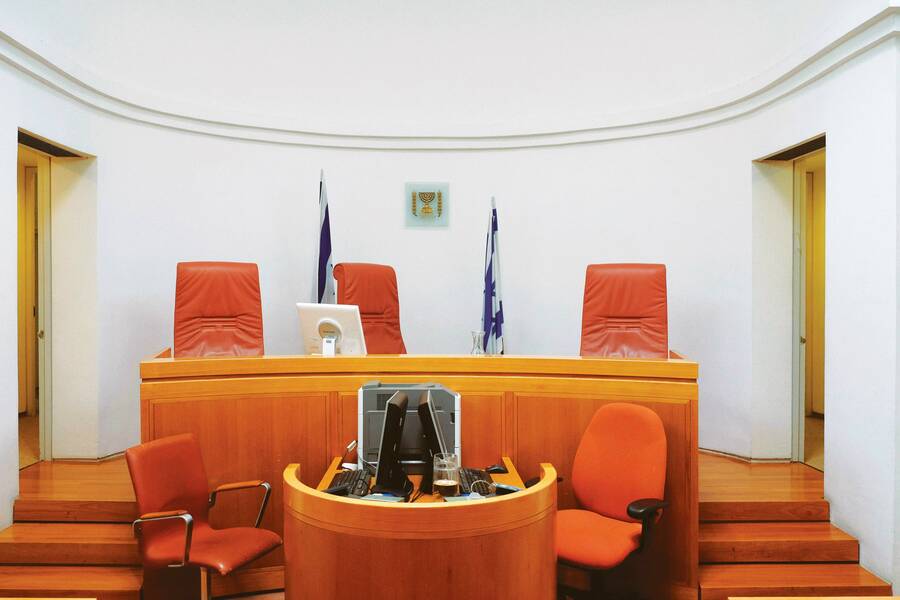
The Long Reach of Restraint
For Israel’s Supreme Court, to exercise power might be to lose it.
LAST DECEMBER, attorney Hassan Jabareen traveled from Haifa, where he lives and works as the founder and director of Adalah—the Legal Center for Arab Minority Rights in Israel, to appear in Jerusalem before a panel of 11 Israeli Supreme Court Justices. The day of his oral argument, he donned the requisite black lawyer’s robes, along with his signature flat cap, and prepared to make a bold claim: that Israel’s most recent Basic Law—a form of legislation akin to a constitutional amendment—was, in fact, unconstitutional.
Israel’s nation-state law—in official parlance, Basic Law: The Nation State of the Jewish People—passed the Knesset in 2018, and enshrines the inferior status of Arab national rights by privileging Jewish ones. It gives primacy to Hebrew as the country’s national language, demoting Arabic from its official status, and asserts the “national value” of Jewish settlement in the land of Israel, committing the state to “encourage and promote its establishment and development.” Above all, it grants Jews an exclusive right “to exercise self-determination in the State of Israel”—meaning, in the words of Likud Knesset member (MK) Avi Dichter, who sponsored the law, that “Palestinians will not be able to define Israel as their nation state.” (Dichter did not specify which Palestinians: the 4.5 million who live under Israeli occupation in the West Bank and Gaza Strip, or the nearly 2 million who live as citizens in Israel.) When the law came up for a vote, late at night after a bitter debate, it garnered a slim majority, passing with only 62 out of 120 Knesset votes. Upon hearing the final tally, Arab Knesset members ripped up copies of the law on the floor of the chamber. Former Justice Minister Tzipi Livni, then a leader of the opposition, called it a “burial certificate” for Israel’s democracy.
Three days after the law passed, leaders of Israel’s Druze minority brought it to the country’s Supreme Court, their only avenue for recourse. Israel’s system of government, in which the executive branch is drawn from the legislature, imposes few limits on the Knesset’s ability to change the direction of the country. Functionally, this leaves the judiciary as the only check on the legislature’s power—yet even that guardrail rests on a shaky foundation. Israel does not have a formal constitution to ground the relationship between its branches of government. Instead, it has a patchwork of Basic Laws—Jabareen calls them “laws of laws”—that, according to a 1950 resolution known as the Harari Compromise, will someday come together to form a constitution. These laws both define the powers of governmental institutions, from the ability to mint shekels to the authority to exert civilian control over the IDF, and function as quasi-constitutional reference points for the Supreme Court. The challenge to the nation-state law left the judicial body in uncharted territory: Did it have the authority to strike down a Basic Law? Without a founding document to anchor the court’s authority, what mandate could it claim to oppose the Knesset?
Right-wing members of the Knesset knew this. Just minutes before Jabareen was set to offer his arguments, Yariv Levin, a member of the right-wing Likud Party who was then the Speaker of the Knesset, sent a message to the court’s president, Esther Hayut: If the court struck down the nation-state law, the Knesset would “not honor its decision.” Just by holding a hearing on a Basic Law, he said, the court was “invoking powers that were not granted to it by law,” and putting itself “above the sovereignty of the people and above the sovereignty of the Knesset” in order to “impose the worldview of its justices as if they were the rulers of the land.” In other words, Levin was arguing that the Knesset’s power trumped the Supreme Court’s—and threatening to manufacture a constitutional crisis if Hayut did not agree. This threat hung over the justices’ heads when they heard Jabareen’s arguments later that day. It was clear that the question of whether to uphold the nation-state law would hinge not only on whether it was constitutional, or whether it was discriminatory, but on whether the justices determined that the court’s reputation could survive a decision to strike it down.
Because its powers are ill-defined and its mandate is opaque, Israel’s Supreme Court is endlessly susceptible to delegitimization from an increasingly populist right. In the 1980s, the judicial branch ranked second only to the IDF in terms of public confidence among Israeli Jews. But according to the Israel Democracy Institute, public trust in the court has since fallen steeply: Whereas 70% of Israeli Jews expressed trust in the court in 2003, today that number is 52%. That confidence has declined most steadily since 2012, when then-Prime Minister Benjamin Netanyahu’s ruling coalition proposed enabling the Knesset to reinstate laws struck down by the Supreme Court. Though this attempt to sidestep judicial review, dubbed the “override clause,” did not become law, it raised the possibility that the Knesset may someday curtail the court’s powers without incurring overwhelming public criticism.
Without a founding document to anchor the court’s authority, what mandate could it claim to oppose the Knesset?
Faced with its own waning legitimacy, the court has developed a pattern of avoiding the political fights that could further damage its credibility. In particular, it has shied away from questions related to discrimination against Palestinians both inside and outside the Green Line, punting on issues that lie at the core of Israel’s identity as a “Jewish” state in which millions of Palestinians live. This is the double-bind in which the Supreme Court is caught: As Israel’s elected leaders work to exclude Palestinians from the body politic, it remains the only institution capable of intervening—but to exercise that power might be to lose it. As it seeks to avoid being written out of Israel’s system of checks and balances, the court is ceding its ability to serve that very purpose, and its place in some of the most fundamental debates about the nature of the state.
ISRAEL’S FIRST PRIME MINISTER, David Ben-Gurion, was in such a rush to have a country that he wrote the final draft of Israel’s Declaration of Independence the night before declaring statehood, on May 14th, 1948. But he was in no rush to see the new country draw up a constitution, even though the Declaration included an October 1948 deadline to create one. A man who once told Shimon Peres that he preferred Lenin to Trotsky because “he was decisive,” Ben-Gurion did not wish to be bogged down by the Knesset debates that would inevitably accompany the writing of such a document. Intellectual debates were fine in the diaspora, where Jews used to “split hairs and argue about a pie in the sky,” as he said in one speech, but, as he declared in another, he feared that such “empty” arguments would “divert us from practical enterprise.”
When it came to the judiciary, it was easiest to retain the colonial structures set up by the British to rule Mandate Palestine. These were courts meant to centralize power: They had judges but no juries, and a simple, three-tiered system of appeal. The highest court served not only as a place of final appeal—in other words, as a Supreme Court—but also as a court of “first instance” to which any subject of the realm could personally bring a grievance against the government; in this capacity, which it holds to this day, it is known as the High Court of Justice. The court did not possess the ability to strike down a law it determined to be unjust, known as judicial review; only a new law could amend or annul an old one.
The nascent state’s judiciary was profoundly shaped by its first Minister of Justice, Pinhas Rosen, a German Jew who became a Zionist in his youth after reading Altneuland, Theodor Herzl’s utopian imagining of a new Jewish society run according to the ideals of Western humanism and German culture. In the first of his three terms in the same office, between 1948 and 1951, Rosen appointed a committee to help fill the courts with those he considered fit to dispense justice: liberal, well-educated Ashkenazi Jews. Fully half of the first Supreme Court bench—including its first president—were native Germans. The first Sephardi justice was not appointed until 1962. His seat was immediately referred to as “the Sephardi Chair,” the exception that proved the Ashkenazi rule.
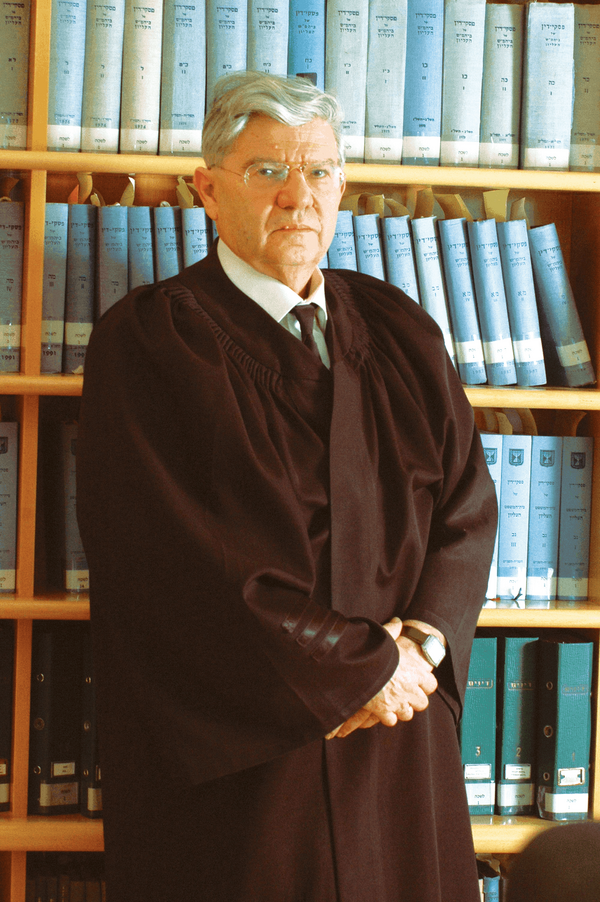
It was only in the late 1980s and early ’90s that the most influential justice to date, Aharon Barak, relieved the court of its British inheritance of judicial powerlessness. He eliminated the requirement that a petitioner must personally have been wronged by a government authority in order to have “standing” to bring a case. This laid the groundwork for the rapid growth of the civil and human rights sector, where dozens of organizations sprang up to bring cases on behalf of claimants. As civil society swelled, so did the Court’s caseload: In 1996, the year Barak became President of the Court, the institution received 1,330 petitions; in 2009, the court heard 11,000 cases, most of them direct petitions brought by civil society groups to the court in its capacity as the High Court of Justice. (By contrast, the American Supreme Court, which is only ever a court of appeals, hears some 80 cases a year.) Barak also undercut Israel’s legal doctrine on “justiciability”—a heuristic that allowed the court to determine whether it was the right body to answer any given question—famously (though perhaps apocryphally) declaring that “everything is justiciable.” If law existed on an issue, the court could rule on it. Finally, Barak helped the court obtain a power that is central to the role of the US Supreme Court: the ability to overturn an unjust law through judicial review.
To put it simply, Barak dramatically expanded the court’s role in Israel’s democracy, positioning it as an ombudsman capable of subjecting the rest of the state to review. Most significantly, he interpreted two Basic Laws—Basic Law: Human Dignity and Liberty and Basic Law: Freedom of Occupation—that the Knesset passed in 1992 to further extend the powers of the court. Unlike Israel’s earlier quasi-constitutional laws, these were not procedural, but rather read like a short, limited Bill of Rights, outlining the rights to dignity, property, and privacy. In 1995, Barak ruled, Marbury v. Madison-style, that these laws granted the court the authority to determine the constitutionality of other laws. In a press conference, he touted the ruling as a “constitutional revolution.” To be sure, this “revolution” did not result in the court knocking down laws left and right (in Israel’s entire history, it has only ever struck down 20), but it did produce a more active court that often interfered with executive decisions. The ruling made Barak’s name synonymous with liberal judicial interventionism. For the rest of his career, he would interpret these new Basic Laws broadly, extending them to cases on religious freedom, gender equality, and LBGTQ rights. His years on the bench remain the highwater mark for civic freedoms and civil equality in Israel.
Decades later, Barak attested to pangs of regret over the possibility that, in the process of building up the court, he had also laid the groundwork for right-wing attempts to cut it down.
Decades later, Barak would say in an interview that he stood by the achievements of his “revolution,” but also admitted that he had perhaps been overzealous—“correct, but unwise,” he said—to flaunt it. He attested to pangs of regret over the possibility that, in the process of building up the court, he had also laid the groundwork for right-wing attempts to cut it down. Barak’s judicial activism had taken place against the backdrop of a changing political landscape. He alighted the bench in 1978, only two years after the anti-elitist Likud won its first-ever electoral victory. Conservative voters, including many Mizrahim previously excluded from power by Israel’s liberal, Ashkenazi-run Labor Party, felt vindicated by the win. In the ensuing decades, segments of the Israeli right came to view the court as a threat to what it called the “sovereignty” of the legislature. What the Ashkenazi elite could not achieve through elections, they argued, it would try to achieve through other, less democratic means. (The left came to view the court in similar terms: as the last bastion of liberal values, and its primary champion in the country’s mounting culture wars.) Populist attacks against the court’s legitimacy, initially waged by Israel’s Haredi right, grew louder as the court became more active in the 1980s and ’90s. By 1999, a quarter of a million Haredi men descended upon the Supreme Court to protest a spate of rulings that eroded the power of religious authorities in Israeli public life. Religious newspapers called Justice Barak a “new dictator” and a “dangerous enemy.”
Yet despite its reputation for judicial activism, the court restrained itself in one key area: cases that touched on Israel’s Jewish character as it related to Palestinians. In 1993, for instance, in response to a petition by the anti-occupation civil society group Peace Now, the court ruled that the question of whether Jewish settlements in the West Bank were legal was “non-justiciable”—not for the court to decide. Though Barak had declared everything justiciable just five years earlier, he quietly declined to extend that new principle to the occupation. This was not for lack of legal doctrine on the issue: Under international law, the transfer of a civilian population into occupied territory is illegal. Indeed, the presiding judge in the case, Justice Eliezer Goldberg, wrote in his opinion that the court ruled the case non-justiciable not because it “lacked the legal tools” to intervene, but because the subject was a “legal mine”—one that the court should not step on because “it will shake its foundations, which are the public’s confidence in it.”
The question had touched the court’s most sensitive nerve: the place where questions about Israel’s Jewishness, territory, and national sovereignty meet. Israel’s leading human rights attorney, Michael Sfard, writes in his book The Wall and the Gate that “the legal battle against the main axis of the Israeli occupation brought the petitioners to the edge of the judicial world, a place where the justices, like Samson, could well lose their hair.” Fearing the loss of its powers, the court decided not to decide. Not surprisingly, then, if you ask most Palestinians if they see the court as “left-leaning,” “liberal,” or “activist,” they think you’re talking about someone else’s Supreme Court. That court, Jabareen told Jewish Currents, is “a court we don’t know.”
THE TENOR OF THESE ATTACKS changed after Benjamin Netanyahu was elected for the second time in 2009—and especially after he appointed Ayelet Shaked to the post of Justice Minister in 2015. Shaked, then a Knesset member representing the right-wing party The Jewish Home, and a close ally of its leader, Naftali Bennett, was “an anomaly in Israeli politics,” as Haaretz put it in 2017, “espousing nationalist, ethnocentric views typical of a rumpled religious male politician from the settlements packaged in an educated secular woman from north Tel Aviv.” In more recent years, Shaked and Bennett founded Yamina—“Rightward”—a party that has sought to outflank Netanyahu’s Likud from the right, and has enabled Bennett to become prime minister.
Shaked made it clear from the outset that she planned to foment a second judicial revolution to counter the legacy of Aharon Barak, who retired in 2006. She argued that Barak had at once commandeered too much power for the court and neglected Israel’s Jewish character, and she vowed to reverse course on both counts, so that—as she explained in a 2017 speech—Zionism would no longer “bow down to the system of individual rights interpreted universally.” She promised to lift up “the will of the people”; her buzzword became “meshilut,” or “governability,” a euphemism for dismantling the power of the judiciary. Specifically, she sought to put more power in the hands of elected politicians by passing the override clause, which would enable the Knesset to reinstate laws that the Supreme Court overturns, and by empowering the Knesset and the cabinet to approve judicial appointments (currently, they are appointed by a committee of professionals, in which politicians are a minority). She also became a leading champion of the nation-state law, which she saw as a way to restore the “balance” between Israel’s commitments to Jewishness and democracy.
Given her talk of the court’s ungovernability, Shaked might have been worried that the body would strike down the pending nation-state law, which reached back into the guts of the state and rearranged them by declaring the supremacy of Jewish national rights. In fact, the opposite was true: Shaked had good reason to believe that the court would not ultimately stand in the way of her project. She knew that, for a court so conscious of its own precarity and without a clear constitutional mandate to anchor it, a Basic Law passed by the Knesset (no matter how slim the majority) would be untouchable. This is why, when the law ultimately passed in 2018, she told a radio show host that if the court struck it down, there would be “an earthquake.” Asked if she was threatening the court, she replied, “Of course I didn’t mean it as a threat. I was describing a given situation: The Supreme Court will not do that.”
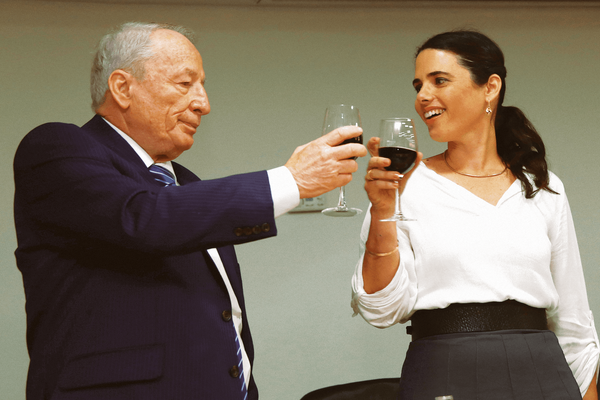
But Shaked was also likely counting on a decades-old dynamic between the court and the legislature, wherein court rulings in favor of equal rights, particularly for Palestinians, were slow-walked, sidestepped, or eventually legislated against in the Knesset. The paradigmatic version of this cycle played out in the wake of Barak’s most celebrated decision in favor of Palestinian rights. In 2000, the justice ruled to allow Iman and Adel Kaadan, Arab citizens of Israel, to settle with their family in the Jewish town of Katzir. Katzir’s admissions committee had excluded them for years on the basis of their ethnicity, but Barak ruled that “the values of the state of Israel as a Jewish state” must not “justify discrimination by the state between citizens on the basis of religion or nationality.” Dan Yakir, a lawyer who argued the case for with the Association for Civil Rights in Israel (ACRI)—Israel’s version of the ACLU—called the decision “the most important ruling in the history of the Supreme Court on the issue of equal rights for Arab citizens of Israel”; others compared it to the US’s Brown v. Board of Education. But conservative lawmakers speculated that the court was trying to “dismantle Israel as a Jewish state,” and threatened to overturn its decision with legislation.
In 2011, the Knesset fulfilled that threat, passing legislation that directly challenged the court’s decision in the Kaadan case. The Admissions Committee Law granted more than 475 majority-Jewish communities in the Galilee and the Negev the legal power to reject individuals deemed “unsuitable to the social life of the community . . . or the social and cultural fabric of the town,” even as it included a clause that nominally forbade discrimination on the basis of race, religion, gender, nationality, or disability. Civil society groups, including ACRI and Adalah, brought the law to the Supreme Court, arguing that it allowed these communities to bypass the court’s 2000 ruling. But the Court upheld the law in 2014, saying that it “wasn’t clear how it would be applied in practice,” and that the petition was therefore immature. Shaked has tried before to take advantage of this dynamic, successfully proposing a law in 2016 that seemed directly intended to undermine the Supreme Court’s longtime stance on the illegality of certain settlement outposts (the court struck it down last year, but it remains to be seen how the legislature will retaliate). The passage of the nation-state law followed the same pattern, but on a constitutional scale: The legislative backlash this time was against the entirety of the Barak court’s legacy. If Barak had used existing Basic Laws to enshrine fundamental democratic rights, a new Basic Law had to be introduced to assert a countervailing claim to Jewish ones.
If the nation-state law was Shaked’s most visible achievement, she engineered an equally consequential victory in the background. Though she didn’t manage to change the method of judicial appointments or pass the override clause in her four years as Justice Minister, she did succeed in appointing a record 334 judges, including six Supreme Court justices—nearly a third of all judges in Israel and 40% of the highest court’s bench. Sfard, the human rights attorney, told Jewish Currents that Shaked wanted “judges who are clerks,” who would follow the orders of politicians. Her appointees to the Supreme Court are young, and hyper-restrained, while those who remain on the bench from Barak’s generation will soon retire. Already, “We see far fewer interventions,” Sfard said.
This summer, Israel’s Supreme Court upheld the nation-state law in a 10-1 decision. The only dissenting opinion came from the sole Arab justice on the bench, George Kara. Chief Justice Hayut’s opinion sought to explain why the existence of a seemingly contradictory basic law—Basic Law: Human Dignity and Liberty—didn’t require the court to overturn the nation-state law, framing the new law as “but one chapter of our formulating constitution,” and the opposing basic law as another. But Hayut’s casuistry does not disguise the reality that the nation-state law stands because the court is too weak to strike it down. Indeed, Hayut said in a previous discussion that for the court to overturn a Basic Law, that law would have to “negate the heart of the state’s democratic identity” and “shake the very foundations of the constitutional structure.” Yet when faced with a law that “constitutionalizes racism,” in Jabareen’s words, the court let it stand. In cases like this, he suggested, the justices were sending a political message to the Israeli right that “the court is not beholden to the left.” Ultimately, it is the Arabs, he said, who “pay the price for this struggle.”
Hayut said in a previous discussion that for the court to overturn a Basic Law, that law would have to “negate the heart of the state’s democratic identity” and “shake the very foundations of the constitutional structure.” Yet when faced with a law that “constitutionalizes racism,” in Jabareen’s words, the court let it stand.
THE ELEPHANT IN THE ROOM, in any discussion of Israel’s judiciary, is that the country runs an entirely different legal system in its occupied territories. There, Palestinians living under occupation are tried in military court while Jewish settlers use the same civilian court system as their fellow citizens within the Green Line. Leading human rights groups define this unequal arrangement as apartheid.
To the extent that Palestinians living under occupation can access legal recourse, it is often through their ability to petition the High Court of Justice. As a lawyer and the executive director of HaMoked, a civil society organization that helps Palestinians navigate the day-to-day injustices of the occupation, Jessica Montell often petitions the High Court on behalf of Palestinian clients. Montell says she wins the majority of cases that involve “one little guy trying to get justice,” like a farmer who needs a permit to enter their agricultural lands, or a traveler who arrives at the Allenby crossing into Jordan and discovers that they’ve been banned from leaving the country. A constant stream of petitions, she said, can challenge the system’s bureaucracy; a minister might change a policy, for instance, “because of the fear that a High Court ruling might not go their way.” Even these small wins for Palestinians have come at a personal cost to the justices. In June, after ruling against the demolition of a Palestinian home, Justice Anat Baron was assigned bodyguards in response to threats she had received. The judicial authority issued a statement saying that the decision to issue a security detail was a “direct result of continued incitement against the judiciary and its judges.”
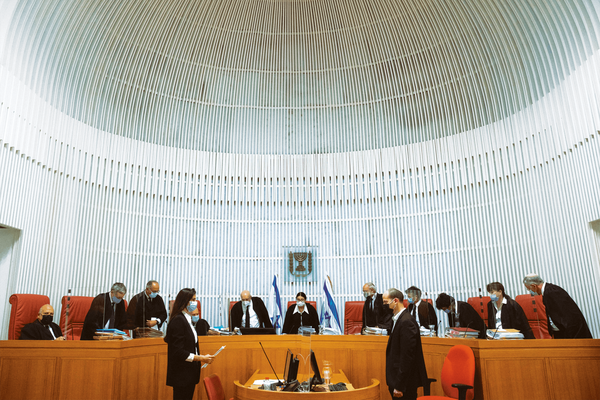
Yet Montell knows that her ability to put out what she called “the smallest of small fires” can provide moral cover for an unjust legal system—one that has, in the name of security, “approved almost every harmful policy and practice pursued by the military in the Occupied Territories,” Sfard writes. Sfard, who also represents Palestinians before the court, writes about this dilemma in The Wall and the Gate: “As long as the civil rights movement is not too successful in court, the regime is better off with it than without it. The reason for this is the image of fairness that the regime is able to project when its opponents fight their battles in the regime’s own arena.” At the same time, at least according to Montell, there is still no better way to fight back on behalf of individual Palestinians than with litigation. “It is the worst tool to use to defend Palestinian rights except for every other tool,” she said.
Back within the Green Line, justices remain willing to hear cases that advance the rights of Israel’s Palestinian minority on small issues related to fairness, and to rule against forms of bias such as inequitable tax incentives, discriminatory national insurance requirements, and racial profiling; Adalah attorneys have observed that the court sees these cases as neutral, because they are about economics, not politics. But when it comes to what one of the organization’s attorneys, Sawsan Zaher, described as “questions of high political controversy or public debate,” the court has abdicated its role.
The most recent, if highly unusual, instance of the court’s attempt to avoid decision-making was on display in the high-profile legal cases of Palestinian families living in the East Jerusalem neighborhood of Sheikh Jarrah. These are cases in which settlers are trying to evict Palestinian families from their longtime homes on the basis of an antiquated 1970s law that, the settlers claim, proves these properties belong to them. (The law itself is untouchable by the Supreme Court because it was legislated before 1992, when Basic Law: Human Dignity came into force. The Basic Law states clearly that judicial review is inapplicable to laws that predate it.) These settlers are explicit about their desire to replace the Palestinian families with Jewish ones—in their terms, to “Judaize” Jerusalem. And there is no doubt that the case is one of “high political controversy”—protests in Sheikh Jarrah were one of the sparks that ignited the last round of violence between Israel and Gaza.
The court cannot help shape Israel’s character—Jewish, democratic, or otherwise—until its citizens grant it the authority to do so.
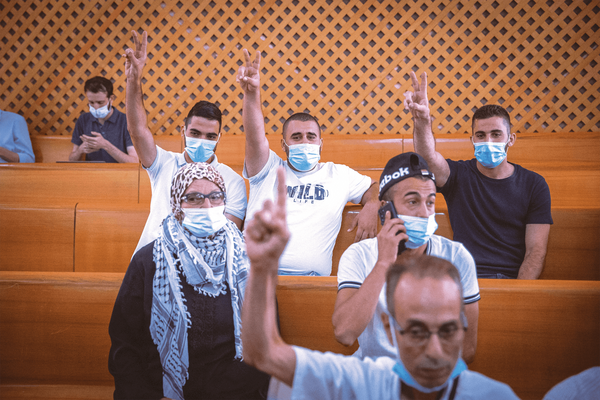
On Monday, August 2nd, many believed that the court was poised to finally rule on who owned four homes in question—and most legal experts believed that the settlers would win. But the court surprised both parties when it declined to rule and instead offered a compromise: The sides would recognize the settler’s ownership over the homes, and the Palestinians would pay a nominal sum in rent, becoming “protected tenants” for three generations. In presenting a settlement instead of a ruling, the court was trying to avoid international outrage, but so far, their decision not to decide has satisfied no one; the Palestinian residents have indicated they will likely reject the proposal.
Today, Naftali Bennett’s new government is promising to define the court’s role vis-a-vis the Knesset by passing Basic Law: Legislation. A previous draft of the bill, which never made it to the floor of the legislature, included sections determining the parameters of judicial review, thus anchoring the relationship between Israel’s branches of government. According to legal scholar Yuval Elbashan, these provisions would “silence those who hasten to yell ‘who appointed you?’ against the Supreme Court every time it rules against their interests.” But it is also likely that the bill will include an override clause. Israeli legal scholar Yuval Shany notes that this would “provide the ruling coalition with yet another legal avenue for restricting the fundamental rights of Israelis.”
Israelis do not agree on the very basic nature of their country. How Jewish is it? What does that mean? When it comes to these fundamental questions, the court—despite the wishes of many on the left—cannot be the source of its own strength. It cannot help shape Israel’s character—Jewish, democratic, or otherwise—until its citizens grant it the authority to do so. Courts are by nature anti-majoritarian; they intervene when the rights of individuals—particularly minority and vulnerable populations—are violated by the state. But the paradox is that the majority must first consent to be checked in the name of minority rights. If Israel’s Jewish majority, and its representatives in the Knesset, won’t grant the court this power, the judiciary will continue to be dominated by the legislature.
“What can the little guy do against a minister who is on a rampage, who enacts policy that contradicts laws?” asked Talia Sasson, a former official in Israel’s State’s Attorney’s office. “The top thing he or she can do is petition the Supreme Court. Without that, what can I do? I can go out and protest. But what good will that do?”
Elisheva Goldberg is the media and policy director for the New Israel Fund and a contributing writer for Jewish Currents. She was an aide to former Israeli Foreign Minister Tzipi Livni and has written for The Daily Beast, The Forward, The New Republic, and The Atlantic.

